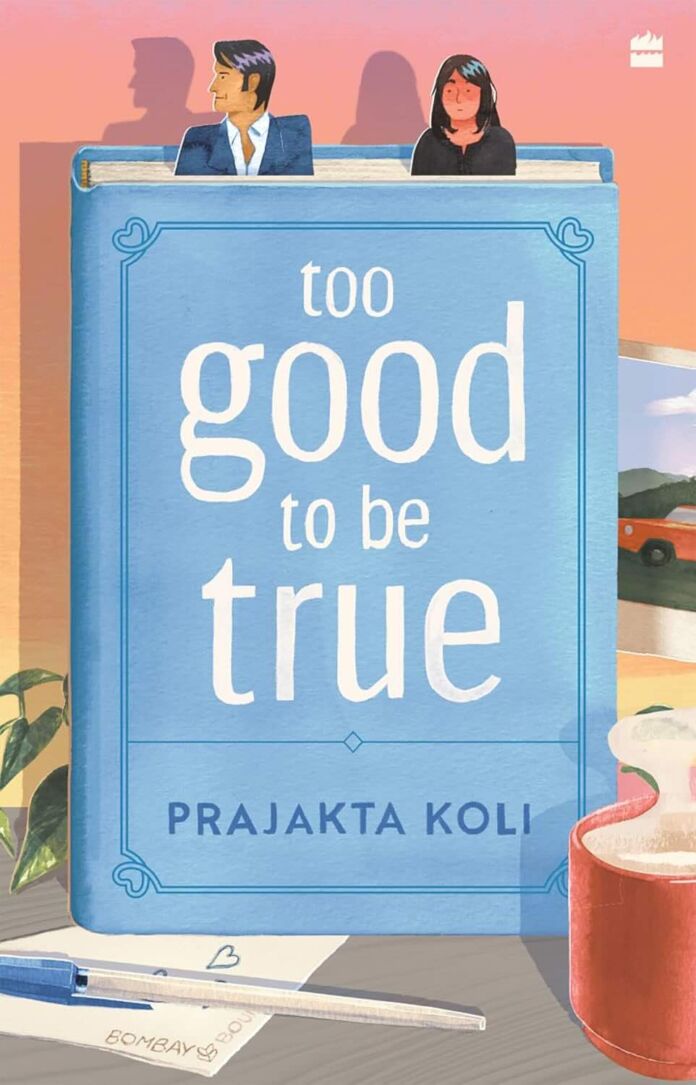In her debut novel Too Good To Be True, digital content creator Prajakta Koli crafts a charming contemporary romance that feels both refreshingly authentic and comfortingly familiar. Set against the vibrant backdrop of Mumbai, the story follows Avani, a law student and part-time bookstore employee, whose life takes an unexpected turn when the seemingly perfect Aman walks into her workplace.
The Story and Plot Development
The narrative unfolds through Avani’s perspective, weaving together the present-day romance with glimpses into her past that shaped her guarded approach to relationships. Koli demonstrates remarkable skill in pacing the central romance, allowing the chemistry between Avani and Aman to develop naturally while maintaining enough tension to keep readers invested.
Key story elements that stand out:
- A meet-cute that cleverly plays with romance novel tropes
- Well-developed secondary characters who feel integral to the story
- Authentic portrayal of modern Indian dating culture
- Natural integration of family dynamics and personal growth
Character Development
The novel’s greatest strength lies in its characterization, particularly of its protagonist. Avani is wonderfully complex – a romance novel enthusiast who’s simultaneously cynical about love, a strong-willed woman carrying deep-seated vulnerabilities. Her internal monologue is entertaining and relatable, offering insights into her fears and hopes that many readers will recognize in themselves.
Aman, while fitting the “too perfect to be true” romantic hero archetype, is given enough depth and personality quirks to feel like a real person rather than just a fantasy. The supporting cast, especially Avani’s friends Martin, Maya, and Rhea, are well-drawn and serve as more than just sounding boards for the protagonist.
Writing Style
Koli’s writing style is engaging and contemporary, with a strong voice that feels authentic to her generation. Her prose is:
- Conversational and accessible
- Rich in humor and witty observations
- Skilled at balancing light moments with emotional depth
- Natural in its use of Indian English expressions
Strengths
Several elements make this novel stand out:
- Authentic portrayal of contemporary Indian urban life
- Well-crafted dialogue that captures different personality types
- Realistic depiction of trust issues and emotional healing
- Strong sense of place and community
- Balanced handling of serious themes while maintaining overall lightness
Areas for Improvement
While generally strong, there are aspects that could have been enhanced:
- Some plot points feel slightly rushed in the final quarter
- A few secondary conflicts could have been more fully developed
- Occasional over-reliance on internal monologue
- Some metaphors and similes feel overused
Cultural Context and Representation
The novel excels at presenting a contemporary Indian romance that feels universal while maintaining its cultural specificity. Koli skillfully weaves in elements of urban Indian life without over-explaining for non-Indian readers, creating an authentic world that enhances rather than overshadows the central love story.
Themes and Depth
Beyond the romance, the novel explores several meaningful themes:
- The impact of childhood trauma on adult relationships
- The balance between protecting oneself and taking emotional risks
- The role of chosen family versus biological family
- The journey of self-discovery and healing
- The challenge of trusting oneself and others
Technical Elements
The structure of the novel is well-crafted, with:
- Effective use of flashbacks
- Strong scene construction
- Natural plot progression
- Well-paced emotional development
Target Audience Appeal
While marketed as Young Adult/New Adult romance, the novel has broader appeal. It will particularly resonate with:
- Romance readers looking for fresh, contemporary voices
- Young adults navigating relationships and career
- Readers interested in modern Indian fiction
- Fans of character-driven love stories
- Anyone who enjoys witty, emotional contemporary fiction
Impact and Relevance
The novel successfully addresses contemporary relationship challenges while maintaining optimism about love. It’s particularly relevant in its exploration of:
- Modern dating dynamics
- Mental health and emotional healing
- Career-life balance
- Family expectations versus personal desires
Comparative Analysis
Fans of contemporary romance authors like Sally Thorne and Emily Henry will find familiar elements here, though Koli brings her own unique voice and cultural perspective. The novel fits well within the current trend of romance fiction that balances humor with deeper emotional themes.
Final Assessment
Too Good To Be True is an impressive debut that showcases Koli’s storytelling abilities and understanding of human nature. While there are some areas for improvement, the overall strength of the character development, dialogue, and emotional authenticity make this a compelling read.
Strengths:
- Engaging, authentic voice
- Well-developed characters
- Strong sense of place
- Balanced handling of serious themes
- Authentic representation of contemporary Indian life
Areas for Growth:
- Pacing in final quarter
- Development of some secondary plots
- Occasional overuse of certain literary devices
Recommendation
Too Good To Be True is highly recommended for readers who enjoy:
- Contemporary romance with depth
- Stories about overcoming emotional barriers
- Authentic representation of modern Indian life
- Strong friendship dynamics
- Character-driven narratives
This debut novel marks Koli as an author to watch in the contemporary romance genre. Her ability to blend humor, heart, and authentic emotion while addressing deeper themes suggests a promising future in fiction writing.
Reading Experience and Emotional Impact
The novel succeeds in creating an emotional connection with readers through its relatable characters and authentic situations. Koli’s background as a content creator shows in her ability to engage readers and maintain interest throughout the story. While some elements could be refined, the overall reading experience is satisfying and emotionally rewarding.
Too Good To Be True proves that sometimes the best love stories are the ones that feel real, complete with all the messiness, uncertainty, and joy that come with opening one’s heart to love.





